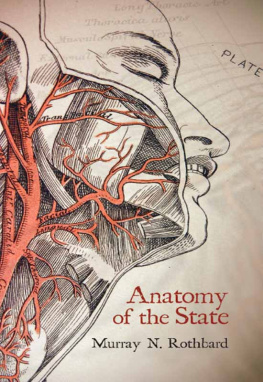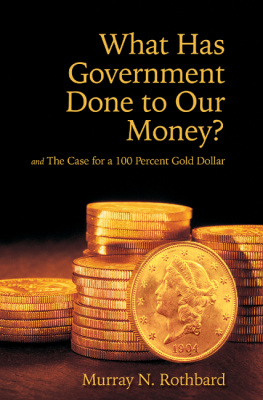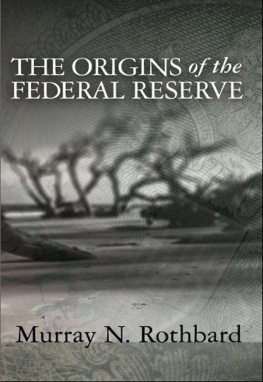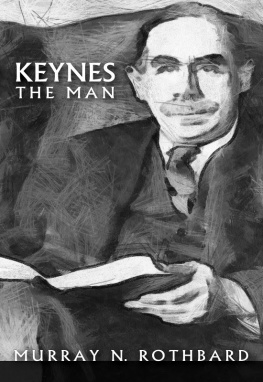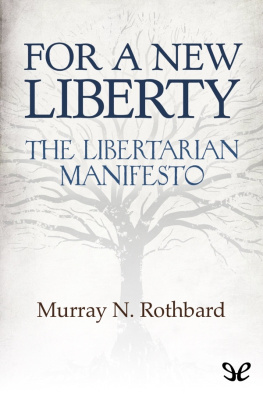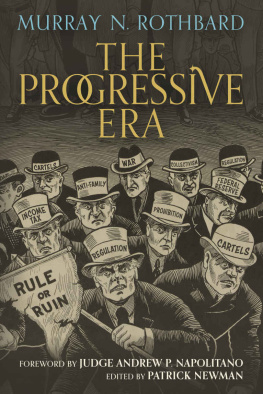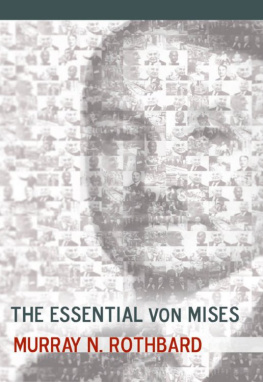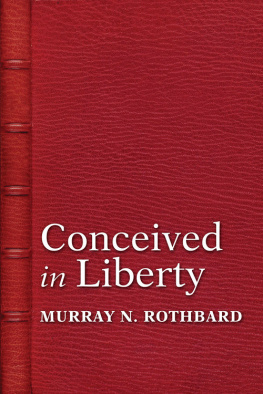Rothbard - Anatomy of the State
Here you can read online Rothbard - Anatomy of the State full text of the book (entire story) in english for free. Download pdf and epub, get meaning, cover and reviews about this ebook. City: Auburn;Ala, year: 2009, publisher: Ludwig von Mises Institute, genre: Politics. Description of the work, (preface) as well as reviews are available. Best literature library LitArk.com created for fans of good reading and offers a wide selection of genres:
Romance novel
Science fiction
Adventure
Detective
Science
History
Home and family
Prose
Art
Politics
Computer
Non-fiction
Religion
Business
Children
Humor
Choose a favorite category and find really read worthwhile books. Enjoy immersion in the world of imagination, feel the emotions of the characters or learn something new for yourself, make an fascinating discovery.
- Book:Anatomy of the State
- Author:
- Publisher:Ludwig von Mises Institute
- Genre:
- Year:2009
- City:Auburn;Ala
- Rating:3 / 5
- Favourites:Add to favourites
- Your mark:
- 60
- 1
- 2
- 3
- 4
- 5
Anatomy of the State: summary, description and annotation
We offer to read an annotation, description, summary or preface (depends on what the author of the book "Anatomy of the State" wrote himself). If you haven't found the necessary information about the book — write in the comments, we will try to find it.
Anatomy of the State — read online for free the complete book (whole text) full work
Below is the text of the book, divided by pages. System saving the place of the last page read, allows you to conveniently read the book "Anatomy of the State" online for free, without having to search again every time where you left off. Put a bookmark, and you can go to the page where you finished reading at any time.
Font size:
Interval:
Bookmark:

ANATOMY
OF THE STATE
ANATOMY
OF THE STATE
MURRAY N. ROTHBARD
LvMI
MISES INSTITUTE

2009 by the Ludwig von Mises Institute
and published under the Creative
Commons Attribution License 3.0.
http://creativecommons.org/licenses/by/3.0/
Ludwig von Mises Institute
518 West Magnolia Avenue
Auburn, Alabama 36832
www.mises.org
ISBN: 978-1-933550-48-0
The greatest danger
to the State
is independent
intellectual criticism.
Murray N. Rothbard
CONTENTS
T he State is almost universally considered an institution of social service. Some theorists venerate the State as the apotheosis of society; others regard it as an amiable, though often inefficient, organization for achieving social ends; but almost all regard it as a necessary means for achieving the goals of mankind, a means to be ranged against the private sector and often winning in this competition of resources. With the rise of democracy, the identification of the State with society has been redoubled, until it is common to hear sentiments expressed which violate virtually every tenet of reason and common sense such as, we are the government. The useful collective term we has enabled an ideological camouflage to be thrown over the reality of political life. If we are the government, then anything a government does to an individual is not only just and untyrannical but also voluntary on the part of the individual concerned. If the government has incurred a huge public debt which must be paid by taxing one group for the benefit of another, this reality of burden is obscured by saying that we owe it to ourselves; if the government conscripts a man, or throws him into jail for dissident opinion, then he is doing it to himself and, therefore, nothing untoward has occurred. Under this reasoning, any Jews murdered by the Nazi government were not murdered; instead, they must have committed suicide, since they were the government (which was democratically chosen), and, therefore, anything the government did to them was voluntary on their part. One would not think it necessary to belabor this point, and yet the overwhelming bulk of the people hold this fallacy to a greater or lesser degree.
We must, therefore, emphasize that we are not the government; the government is not us. The government does not in any accurate sense represent the majority of the people. No organicist metaphor, no irrelevant bromide that we are all part of one another, must be permitted to obscure this basic fact.
If, then, the State is not us, if it is not the human family getting together to decide mutual problems, if it is not a lodge meeting or country club, what is it? Briefly, the State is that organization in society which attempts to maintain a monopoly of the use of force and violence in a given territorial area; in particular, it is the only organization in society that obtains its revenue not by voluntary contribution or payment for services rendered but by coercion. While other individuals or institutions obtain their income by production of goods and services and by the peaceful and voluntary sale of these goods Having used force and violence to obtain its revenue, the State generally goes on to regulate and dictate the other actions of its individual subjects. One would think that simple observation of all States through history and over the globe would be proof enough of this assertion; but the miasma of myth has lain so long over State activity that elaboration is necessary.
__________________
Originally published in Egalitarianism as a Revolt Against Nature and Other Essays by Murray N. Rothbard (Auburn, Ala.: Mises Institute, 2000 [1974]), pp. 5588.
We cannot, in this chapter, develop the many problems and fallacies of democracy. Suffice it to say here that an individuals true agent or representative is always subject to that individuals orders, can be dismissed at any time and cannot act contrary to the interests or wishes of his principal. Clearly, the representative in a democracy can never fulfill such agency functions, the only ones consonant with a libertarian society.
Social democrats often retort that democracymajority choice of rulerslogically implies that the majority must leave certain freedoms to the minority, for the minority might one day become the majority Apart from other flaws, this argument obviously does not hold where the minority cannot become the majority, for example, when the minority is of a different racial or ethnic group from the majority.
Joseph A. Schumpeter, Capitalism, Socialism, and Democracy (New York: Harper and Bros., 1942), p. 198.
The friction or antagonism between the private and the public sphere was intensified from the first by the fact that... the State has been living on a revenue which was being produced in the private sphere for private purposes and had to be deflected from these purposes by political force. The theory which construes taxes on the analogy of club dues or of the purchase of the service of, say, a doctor only proves how far removed this part of the social sciences is from scientific habits of mind.
Also see Murray N. Rothbard, The Fallacy of the Public Sector, New Individualist Review (Summer, 1961): 3ff.
M an is born naked into the world, and needing to use his mind to learn how to take the resources given him by nature, and to transform them (for example, by investment in capital) into shapes and forms and places where the resources can be used for the satisfaction of his wants and the advancement of his standard of living. The only way by which man can do this is by the use of his mind and energy to transform resources (production) and to exchange these products for products created by others. Man has found that, through the process of voluntary, mutual exchange, the productivity and hence, the living standards of all participants in exchange may increase enormously. The only natural course for man to survive and to attain wealth, therefore, is by using his mind and energy to engage in the production-and-exchange process. He does this, first, by finding natural resources, and then by transforming them (by mixing his labor with them, as Locke puts it), to make them his individual property, and then by exchanging this property for the similarly obtained property of others. The social path dictated by the requirements of mans nature, therefore, is the path of property rights and the free market of gift or exchange of such rights. Through this path, men have learned how to avoid the jungle methods of fighting over scarce resources so that A can only acquire them at the expense of B and, instead, to multiply those resources enormously in peaceful and harmonious production and exchange.
The great German sociologist Franz Oppenheimer pointed out that there are two mutually exclusive ways of acquiring wealth; one, the above way of production and exchange, he called the economic means. The other way is simpler in that it does not require productivity; it is the way of seizure of anothers goods or services by the use of force and violence. This is the method of one-sided confiscation, of theft of the property of others. This is the method which Oppenheimer termed the political means to wealth. It should be clear that the peaceful use of reason and energy in production is the natural path for man: the means for his survival and prosperity on this earth. It should be equally clear that the coercive, exploitative means is contrary to natural law; it is parasitic, for instead of adding to production, it subtracts from it. The political means siphons production off to a parasitic and destructive individual or group; and this siphoning not only subtracts from the number producing, but also lowers the producers incentive to produce beyond his own subsistence. In the long run, the robber destroys his own subsistence by dwindling or eliminating the source of his own supply. But not only that; even in the short-run, the predator is acting contrary to his own true nature as a man.
Font size:
Interval:
Bookmark:
Similar books «Anatomy of the State»
Look at similar books to Anatomy of the State. We have selected literature similar in name and meaning in the hope of providing readers with more options to find new, interesting, not yet read works.
Discussion, reviews of the book Anatomy of the State and just readers' own opinions. Leave your comments, write what you think about the work, its meaning or the main characters. Specify what exactly you liked and what you didn't like, and why you think so.

